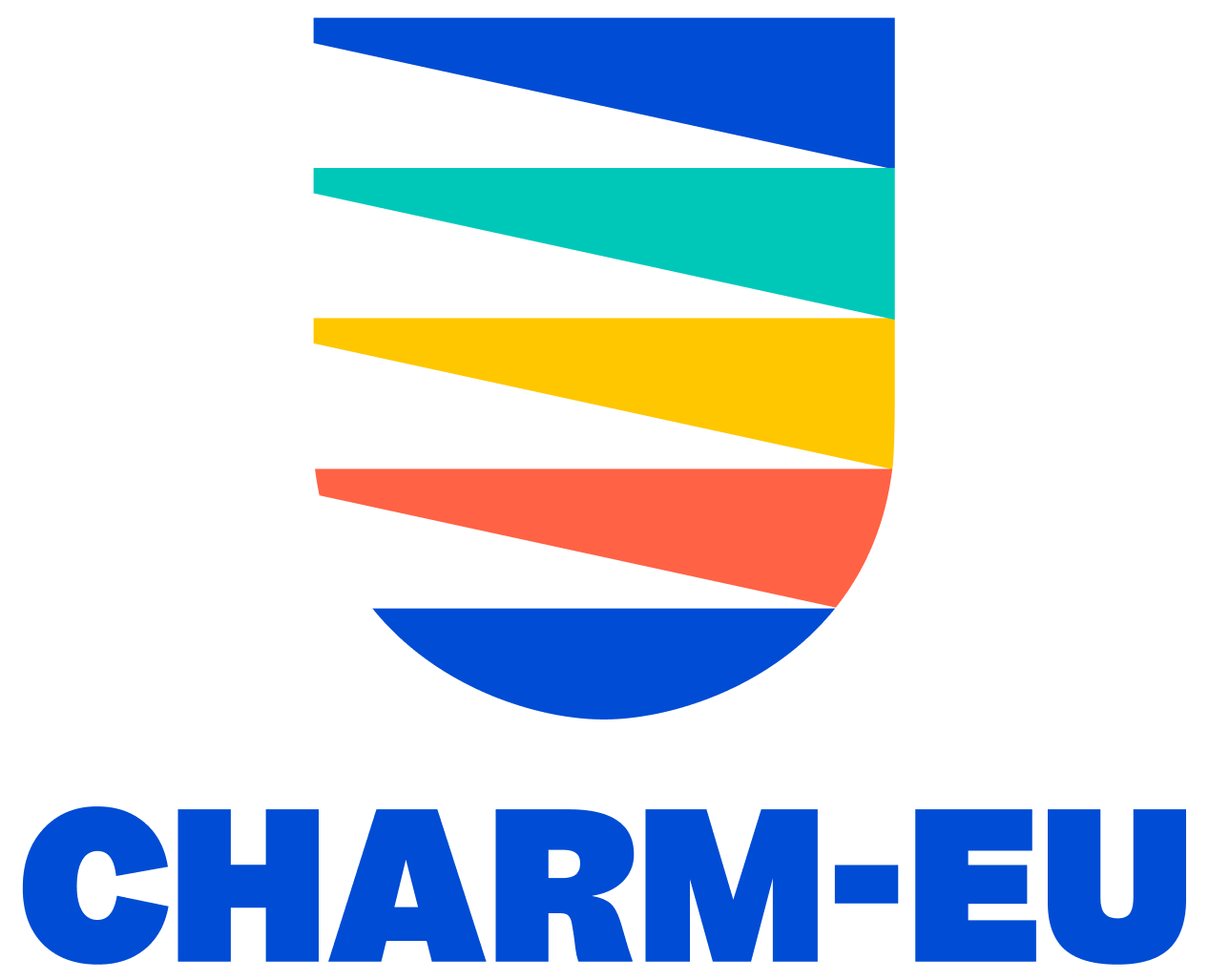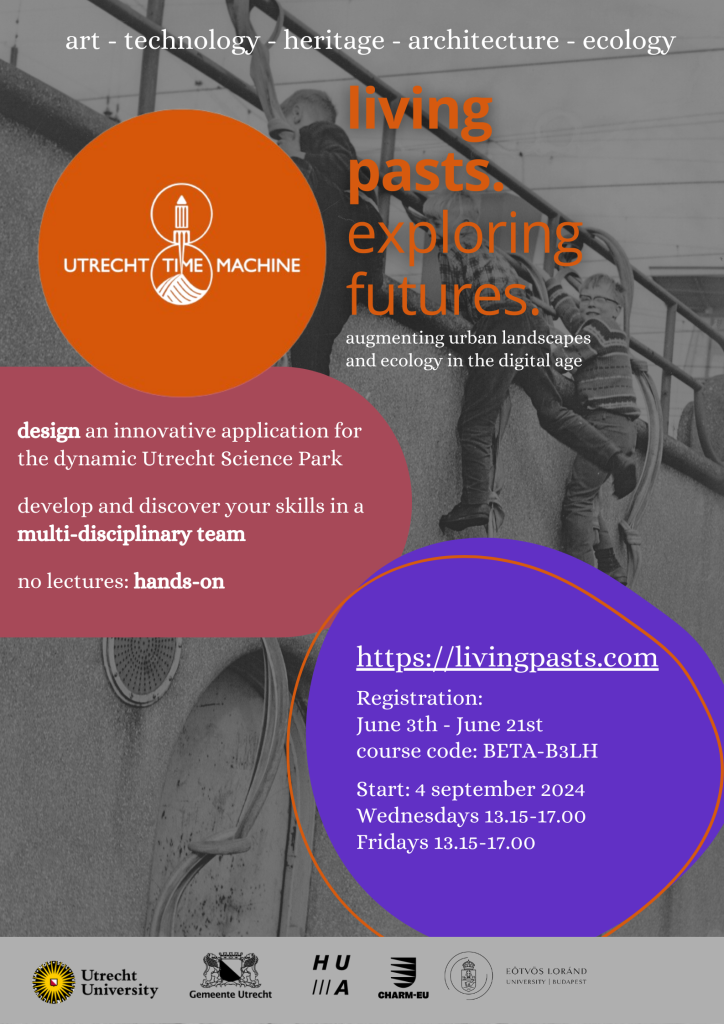In 2023, Eötvös Loránd University (ELTE) and Utrecht University (UU) started to plan a new collaboration based on cultural heritage and digital humanities. The main objective of the project was to adapt at ELTE the ‘Living Pasts’ course, a challenge-driven and research-based approach of the digital humanities offered by UU, open to students from all faculties of their university (https://livingpasts.com/).
Video testimonial by Orsolya Réthelyi, Alexandra Anders and Dániel Veress, members of the ELTE Living Pasts team
Read more
The first step was a workshop organised by UU in Utrecht in September 2023. A delegation from the Faculty of Humanities of ELTE were joined by a colleague from Montpellier University and the University of Barcelona.
During two days the group was introduced to the ‘Living Pasts’ course. The discussions with colleagues and in particular the Living Past seminar where UU students presented their preliminary prototypes convinced the members of the ELTE delegation that it would be worthwhile to adapt this challenge-based pedagogical method of the Living Pasts course at ELTE.
The second workshop of the unfolding project was organised by ELTE Faculty of Humanities in Budapest on 14 and 15 December 2023. Three colleagues represented the Living Pasts team from UU, ELTE colleagues were present from different faculties, but also students and external stakeholders, colleagues from museums and archives joined the workshop.
During the two-day workshop participants discussed the potential and practical aspects of adapting and hybridising the Living Pasts course with UU and ELTE colleagues, academics, digital humanities experts and heritage professionals from Budapest. External stakeholders, such as the Budapest City Archives, were also involved in the emerging collaboration.
During the workshop the group visited the Budapest archives. The Municipality of Budapest and the Department of Urban Planning were also invited, and this institution was represented by the Chief Architect of Budapest.
The workshop was closed with a short ‘Field Trip’, a guided walk on the site being in the focus of the course in 2024, the City Wall of Budapest where the archaeological, historical and cultural aspects were discussed. The workshop provided an inspiring step in the international academic cooperation within CHARM-EU and preparations for the Living Pasts course at the ELTE in September.
SOMETHING FOR YOU TOO? CHECK OUT THESE RESOURCES!
See this video about the Living Pasts project in Utrecht
Read this article about the collaboration between UU and ELTE
Read the report of Orsolya Réthelyi, coordinator of the ELTE team about the trip to UU
WOULD YOU LIKE TO START ADAPTING A COURSE YOURSELF? SEE OUR GUIDES!
| Step | Action | Who should be involved? | CHARM-EU Guides / Support |
|---|---|---|---|
| 1 | Desired course selected by the adapting institution, (henceforth ‘University A’) at another university (henceforth University B). This can happen through semi-formal academic channels (contact with partner department) or using the CHARM-EU Guide of Experts. | Responsible leadership (e.g., head of department), academic staff | CHARM-EU Guide of Experts |
| 2 | Finding a team of dedicated teachers at University A university who are interested in CHARM-EU Educational Principles, preferably from across disciplines. | Academic staff, educationalist | CHARM-EU Educational Principles For training and onboarding to CHARM-EU, see Support Request below. |
| 3 | Representatives of University A visit University B and take part in the course in the university where it is offered. Meeting teachers, students, stakeholders, discussing possibilities, familiarizing oneself with CHARM educational principles in practice. | Academic staff, educationalist, students | Guiding Principles for Networking & Community Building When organising workshops, we recommend you use the Design Thinking approach For networking support, see Support Request below. |
| 4 | Developing the course for home circumstances of University A but keeping contact with University B to integrate possible points of contact between the two courses at the partner universities. | Academic staff, educationalist | On the CHARM-EU challenge-based learning methodology see section 2.1 of the CHARM-EU Pedagogical Guidelines On CHARM-EU Mobility solutions, consult pp. 23–24 of the CHARM-EU Teaching and Learning Strategies Handbook |
| (5) | (If possible) A second workshop where the teachers from University B visit University A and take part in the development of the course. Visiting locations (if relevant), meeting teachers involved, representatives of the students, stakeholders, furthers discus the possibilities of collaboration and possibilities of collaborating in the new course. | Academic staff, educationalist, students | See above |
| 6 | Course is offered (possibly simultaneously) in both locations with points of contact integrated into programme (hybrid classroom, shared assignment for students from both universities, mobility). The course can become a collaborative endeavour of the two partners. | Academic staff and students of the course | Based on preliminary discussions, CHARM-EU might be able to support the promotion of the course. |





